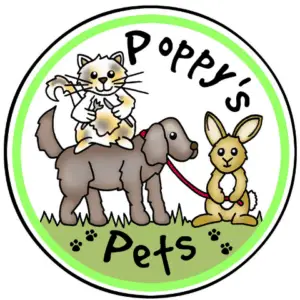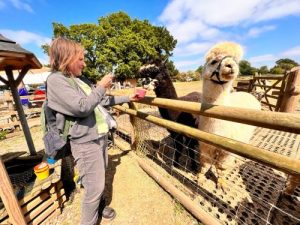The aim of care farming is therapy-based for those coping with mental health, healing from trauma or emotional impact, educational purposes, learning disabilities and creating calmness for those with dementia and social isolation. Today, we live in a neverending spiral of relentless hustle and bustle, and experiencing a tranquil haven can provide an escape.
Care farming in the UK comprises of approximately 400 farms, all sharing a common focus. They provide a diverse range of nature-based therapy and activities. Interacting with animals, learning horticulture, helping with livestock, and immersing in nature can help rejuvenate the mind. Care farming is for all ages and addresses various needs.
Moreover, care farming relating to animal therapy extends its appeal to families, offering a delightful day out and an array of experience packages involving animals.
My experience of a care farm was in June at Lucky Tails, focusing on walking Pepper, a sweet-natured donkey followed by feeding goats, small furries, pigs, alpacas and meerkats. This article is based on what Lucky Tails Care Farm offers.
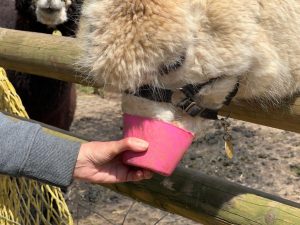
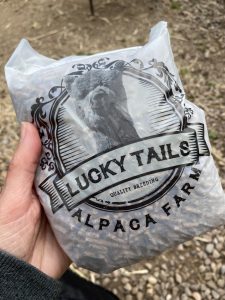
Care farming with animals covers:
- Walking, grooming & feeding donkeys
- Walking & feeding alpacas
- Cuddling meerkats
- Feeding goats, sheep, pigs
Care farms can help you because they are more than just a farm; they are where growth, understanding, and renewal can begin. The enjoyment can relieve the mind of anxiety, if but for the short term.
Lucky Tails Farm is set in the idyllic countryside of Warwickshire. As its name suggests, this enchanting place is more than just a typical farm; its mission is to bring healing, education, and a unique donkey and alpaca-centered experience to individuals from all walks of life. Incidentally, the alpacas are available for weddings too!
Mental health and emotional healing
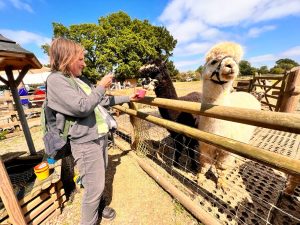
Spending time with animals can challenge mental health issues positively, whether petting, feeding, or simply being in their presence, helping to reduce stress, anxiety, and depression. Temporarily bad thoughts and worries can be forgotten.
You might find a care farm incorporating physical activities involving animals, such as horseback riding. At Lucky Tails you groom and feed donkeys, followed by a walk with one assigned to you. If horse riding helps you, search online for a care farm or visit an equestrian centre offering one-off sessions. I used Woldgate Trekking Centre in Bridlington.
For individuals dealing with emotional trauma or loss, the companionship of animals can provide comfort and support. Animals play a vital role in the healing process, and stepping into another environment can be fulfilling if you allow it.
Healing extends to both the mind and body. Caring, stroking or simply being with an animal accepting you as you can create a calming, healing effect on the mind. If you are bonded to your own pet at home, you’ll understand how the companionship of animals contributes to helping your mind during life’s challenges.
Achieving tasks related to animal care can boost one’s sense of accomplishment and self-esteem too. This is particularly valuable for individuals who struggle with self-confidence.
When I visited Lucky Tails in the spring, I had just fled a domestic abuse relationship. The combination of grooming, feeding and walking Pepper relieved me from bad memories and helped me smile and laugh. I hadn’t laughed or smiled in over a year.
As you’ll learn from my video, this care farm allows you to feed goats, chickens, pigs too. Sometimes a naughty goat escapes too as shown in my video!
Watch the Video: Lucky Tails Care Farm in Warwickshire
Healing and calmness for dementia
Life changes for people with dementia, slipping in and out of confusion and forgetfulness. Many face social isolation. We took our Nan out and about but as the dementia became more extreme, finding suitable activities and places to visit became difficult. But what I love about Lucky Tails, staff will bring a donkey or alpaca or two to a residential home giving the opportunity to feed and stroke the animals.
Enquire about residential visits.
We often hear of trained and qualified therapy cats and dogs visiting care homes and hospitals to interact with people coping with dementia or age-related. Incidentally, The Cinnamon Trust has a list of care homes that welcome residents’ pets to live with them.
At Lucky Tails, for example, the elderly can stroke donkeys, even feed them from a miniature pot, and visit other animals. These activities can provide emotional and cognitive stimulation for dementia patients because of the sensory experience of touching, petting, and talking to animals, triggering positive emotions and memories.
Dementia patients often experience episodes of agitation, anxiety and forgetfulness. Animal interactions have been shown to reduce these symptoms by providing a calming and soothing effect. Dementia patients may become more communicative and engaged when interacting with animals, as well as with the caregivers and other participants in the care farm program.
Family bonding
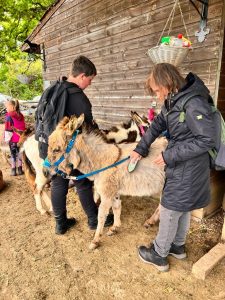
Care farming is not limited to individuals. Life is busy today and this type of activity provides an opportunity for families to spend quality time together. Participating in different animal-related activities with animals can strengthen family bonds and create cherished memories. Interaction with animals also teaches children about animals especially when care is explained by qualified staff.
Educational healing
Care farming provides educational opportunities. Learning about these topics fosters intellectual growth and can benefit children and adults or provide insight for those looking to acquire new skills. Care farms will liaise with authorities to organise an educational visit.
Children with learning disabilities
Care farms tailor their programs to accommodate individuals with learning disabilities, providing a supportive and inclusive environment. This can include specialised therapy for children or programs for individuals with mental or physical disabilities.
Natural-based healing
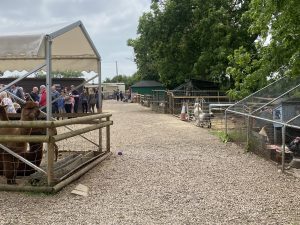
The natural setting of care farms allows individuals of any age to immerse themselves in the healing power of nature. Time spent outdoors, surrounded by animals and fresh air, can have a calming and rejuvenating effect, improving mental health, whether temporary or long-term.
Related articles:
- Grey Fern Equestrian Centre – compete or be a spectator
- Caring for your first donkey
- Cinnamon Trust – volunteer or get assistance in your home
The overall effects of an animal care farm
Bonding with animals can promote emotional and social healing for almost every need. Individuals with difficulty forming human connections often find establishing trust and companionship with animals easier, leading to improved interpersonal skills and emotional growth. Alternatively, you could search for local equestrian centres and watch competition events. For example, dressage or show jumping with adult and children riders.
If you are considering adopting a donkey, visiting a care farm with donkey experiences and acknowledgement staff can offer great insight into the responsibility.
Related questions:
Can we buy refreshments at care farms?
I cannot vouch for other care farms, but Lucky Tails has a small cabin with snacks, refreshments and ice cream for sale. You’ll find adequate seating, including undercover if required, to consume food or your own picnic.
How much is it to visit a care farm?
Experiences cost from £7.50 for children and £15 for adults – we redeemed Virgin Vouchers. For prices for group visits, please contact Lucky Tails directly.
General entry into Lucky Tails TBC
Can I book an alpaca for my wedding?
Absolutely! I was employed as a wedding planner and Alpacas came to the wedding. Check with the wedding venue first. Lucky Tails provides this service, too.
Key takeaways:
- Care farms can cost very little to visit
- Beneficial for healing whatever you’ve experienced
- Care farms suit anyone regardless of needs
- The activity represents an enjoyable experience
- Entrance costs contribute towards the upkeep of a care farm
- Group visits can be arranged with the farm to provide the necessary setting
- Opportunity to groom and feed animals
- Other care farms available are horticulture, livestock, allotment-type
